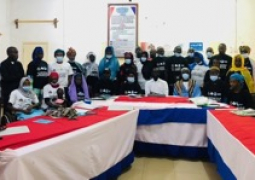
The graduation was held at the National Nutrition Agency (NaNA).
The graduation comes after a five-week intensive training on basic and standard ethical principles governing journalism.
Speaking on the occasion, Sang Mendy, managing director of MAJaC, said unethical journalism gives room to the government and other stakeholders to regulate the media, which he said, is not the desire of the media.
He reminded that journalists should care about their credibility and the credibility of the media, saying the capacity building programme is designed to produce ethically guided and responsible journalists, who would tackle ethical dilemmas that come before them for the interest of the society.
He challenged the graduates to go out there and make the difference by sharing the knowledge among their colleagues and implement the knowledge gained to safeguard the profession as it continues to gain the trust of the people.
Muhammed S. Bah, President Gambia Press Union (GPU), while congratulating the graduates, commended the organisers for initiating such an essential training.
He described the graduates as ambassadors of ethics and that they should make sure the knowledge acquired is reflected in their stories.
“We have seen how the media is been unethical and by extension causing mistrust in the country. Therefore, I am pleading with you to share what you gained with your fellows to mitigate or even eradicate the unethical reporting in the media.” he added.
Judy Order, country representative Freedom House, said following the 22 years of dictatorship, The Gambia is navigating a delicate transition with ambitious plans to restore the rule of law, build strong institutions, enhance good governance amongst others.
Therefore, she observed that it is important to train journalists to have an understanding of information flow and know-how to write information that is ethically guided.
These 21 journalists, she added, are the pioneers of many that would benefit from thatprogramme.





